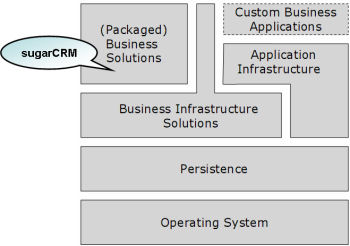![]() Beginning of November, I have published a first post about sugarCRM. As promised, some other inputs about this open source company.
Beginning of November, I have published a first post about sugarCRM. As promised, some other inputs about this open source company.
Positioning of sugarCRM within the Open Source Stack (view from Optaros):

As far as I understood, sugarCRM has about the same (working) business model as mySQL, that means:
- a GPL license BUT they keep their roadmap totally under control, as the technical decisions. it is exactly a so-called “dual-license”, that means it exists a commercial and open source version of the product.
- the collaboration with the community is not very extensive, that means, the development is mainly based on internal resources.
- they are spreading their application on internet (website, blog) because of the availibility of an open source version (325’000 copies within 8 months!!!).
- they are using the LAMP (linux apache mySql PHP) stack, which ensures a) a very low cost structure (no license required) b) a complete portability of the solution c) a very attractive technical solutions for the geeks and SW-engineers ;-)
- the core team has a huge business know-how and they are specialized in CRM solutions for years.
- it is the first time that a start-up is entering the so-called open source business-solution-stack. till today, the succesful companies were more present in the so-called infrastructure-solution-stack (linux, apache, mySql, jBoss).
- their business case is based on “derivatives”: consulting, plugins (as the outlook ones), hosting (ASP solution), support, customization.
- they found a *lot* of investors who invested a *lot* of money. last round: 19 mio $.
Have a look at what they are saying on their website:
We believe the SugarCRM open source business model is far more efficient than the classic approach to building propriety CRM software. We do not believe in the notion of hiding access to code in order to lock-in customers.
Since the open source project is such an effective marketing mechanism, open source companies can keep their sales and marketing costs low. Revenues are invested back into product development. Our prices are substantially lower than what CRM vendors charge today the majority of your subscription costs goes back into product development, not into marketing and selling the solution. Download and install the freely distributed Sugar Open Source application. If it works for your company, we ask that you participate in the SugarCRM Community through forum discussions or code contributions. If you need the functionality in Sugar Professional or Sugar Enterprise, give us a call. We want you to become a customer once we have proven we have generated value for your company, not one minute sooner.
And, on sugarForge:
The reason there are so few CRM vendors is not because it’s costly to build great CRM applications, but because of the costs required to market and sell CRM applications. Take a look at the financials of any of the established CRM players, both hosted and on-premise. What you will see is that less than 15% of a CRM vendor’s revenue is applied to product development and easily 50-70% of revenue is allocated to sales and marketing expenditures. This has been the norm for traditional software companies, but is it the right model for today?
There is a perception today that if you host or rent your CRM application you will save money over time. The marketing engines of the leading hosting vendors have done an outstanding job selling folks on this premise. It is completely false.
Renting a proprietary hosted CRM application at $50-100 per user per month over a three year period far exceeds the cost of running an open source based CRM application. With a stock Linux server you can be up and running with SugarCRM in less than 15 minutes – installation is that easy and SugarCRM is far more flexible and extendable than anything you can rent from a hosted CRM provider.
Recently there have been a number of industry analysts quoted saying “the enterprise applications industry is dead“. We believe they are right. Modern open source based software companies are built on business models that are much more efficient and cost effective in building software, distributing software and acquiring customers. They spend far less on marketing and sales and far more on engineering and quality. Since the open source project is such an effective marketing mechanism, open source companies can keep their sales and marketing costs low.
Providing application source code is a good thing. Gone are the days of ‘custom demos’ by trained sales consultants or “Model T” application trials from hosting providers. At SugarCRM, our source code is available to all. Our bug lists are published, our feature roadmap laid out, our quality assurance testing shared with real customers – in real time. Download SugarCRM today. Install it, run it for free, build new components, interact with other Sugar enthusiasts and the Sugar team on the forums.
